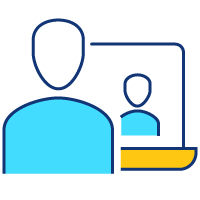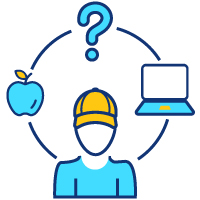It is impossible for me to exaggerate the importance of educators in my life. My own mother was a much-loved English teacher for over four decades. Because my father was career Army, we moved regularly and my mother positively affected the lives of children from New Jersey to California and from Louisiana to Alaska.
From the beginning, my parents were dedicated to my education and that dedication led my father to sign on for an extra tour in Vietnam so I could stay and graduate from the high school I was attending. He received a Purple Heart for wounds sustained during that tour and I will be forever grateful for his sacrifice. These and many other experiences taught me never to take education for granted and they inspired a lifetime of learning as I went on to earn bachelor’s and master’s degrees in engineering and later my MBA.
After many years in business, I returned to education by joining the K12 board of directors. Online and blended (both in-person and online) schools were still relatively new and I wasn’t sure what to expect. Soon, I saw that the K12 team was committed to helping students from all walks of life just as my mother had been. They provided opportunities for an extraordinary range of students to reach their potential. Some were academically-gifted and others faced challenges; some were city kids, others from rural areas; some had never left their birthplace and others were itinerant students like me. After I attended a graduation and got to know students and their families, I realized that the online model wasn’t perfect, but it was changing lives.
Eventually, I got more involved with K12 and became part of the management team. At the time the teachers, school leaders, parents and students were under fire for the instructional model and its results. While many of the accusations were unfair, we believe in constant improvement and we knew that changes were in order.
Making Changes
One of the problems was that, as a private company, we were not always letting our teachers’ and school leaders’ passion drive the students’ education. First and foremost, we needed to harness that passion to help students achieve academic results. I also knew we needed new leaders from the education community and asked Kevin Chavous, who has devoted his life to improving education, to serve as president of Academics, Policy and Schools. With Kevin engaged, K12 began to make even more progress.
We zeroed in on three key areas for improvement: personalized data-driven instruction, effective teachers, and wrap-around student services (see sidebar for greater detail):

Data-driven Instruction: We have long known that personalization is the key to student success and that data improves instruction, but we’ve also learned how important it is to train teachers on how to use it. Our Instructional Coaching program’s 50+ coaches have spent more than 2,600 hours with teachers, empowering them to take hold of their instruction and to use data to its fullest extent.

Effective Teachers: Everyone agrees that effective teachers are critical to student success, but a traditional classroom can be very different from an online or blended school. Our Teach360 platform has trained over 5,000 teachers, and we are working with Southern New Hampshire University to launch a M.Ed program in 2019 that focuses on virtual instruction.

Wrap Around Services: Just as in traditional schools, virtual school students often need extra help and we must innovate within limited budgets. These services help children with a wide range of needs and we know that our attention is paying off. According to a spring 2018 survey, 90 percent of parents of students with disabilities said our programs perform better or equivalent to those at their previous schools.
Improving Student Outcomes
All our efforts are focused on improving the online and blended learning model and helping students achieve better outcomes. We improved the curriculum and support services aimed at serving students who were behind grade level when they enrolled. Based on teacher input, we have made a significant investment to align curriculum to changing assessments and state standards. We also developed a key guide to school improvement for school leaders called the Academic Excellence Framework.
The Framework helps schools implement processes that prioritize the creation, analysis and use of student data, at both the school and student level. To fully understand each student’s individual strengths, weaknesses and needs, teachers constantly review a student’s engagement and performance on class assignments and assessments. Teachers then identify gaps and can provide extra instruction on the same day a student shows signs of falling behind.
A number of schools that have implemented this framework, such as Arizona Virtual Academy (AZVA), have seen significant academic improvements among students. In 2016-17, the percentage of AZVA students achieving proficiency in English and in Math grew nearly 13 and 11 percentage points, respectively. Moreover, we’ve seen a 21 percent increase in student engagement with direct instruction overall.
These programs are also showing progress in other schools across the country:
- Insight Indiana and Hoosier Indy (blended) moved from earning an F grade to a C for the 2017-18 school year.
- Louisiana Virtual Charter Academy ranked #22 in the state for ACT scores.
- Students with disabilities at Idaho Virtual Academy beat the state average in both English and Math by 4.5 and 5.9 percentage points respectively on the 2018 Idaho Standards Achievement Test.
Applying Lessons Learned to Improve Online Learning
While these are all good signs, we’re not afraid to admit our shortcomings as we learn from both successes and failures. We’re not satisfied when a school has a ‘C’ or a ‘D’ rating, even when we have already improved a school by two or more letter grades. While these gains are encouraging, we need to keep working to get these schools where they need to be.
Focus on Blended Learning
We enthusiastically embrace the concept of “blended learning” by offering more opportunities to take online education offline to strike a better balance that works for each student. To achieve this, K12 is working to increase opportunities for student socialization, personal contact between student and teacher and in-person, face-to-face learning programs.
Career Readiness for all Students
We also know that the evolving workplace increasingly places a premium on career readiness programs and curriculum. K12 is breaking new ground by exposing students to career pathways through project-based learning as early as middle school. Students also have the opportunity to enroll full-time in career pathway programs, receive hands-on experience and obtain a certification that can help them get a full-time job or internship. Essentially, they get a head start in whatever path they chose after high school — whether that is entering the workforce, military service or enrollment at a two or four-year college. Career readiness is a major initiative that we intend to expand to all schools.
While we know that online and blended schools are not the answer for every student, I believe families will continue to demand more online and blended learning options in the years ahead. Helping them succeed means committing to continuous evaluation and improvement. Each one of us at K12 is committed to realizing the full potential of online and blended learning.
KEYWORDS: Personalized Learning, Blended Learning, Career Readiness, Constant Improvement, Courses, CTE, Curriculum, Dual Enrollment, Families, High Achievers, Metrics, Professional Development, Results, Socialization, Teachers, Unlocking Potential

